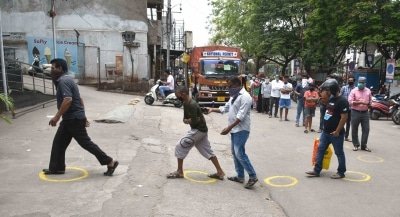<br>”There is very little data available, and at the same time it is difficult to predict that it is less virulent and different from strains prevailing in countries which have serious problems,” Rakesh K Mishra, Director at Centre for Cellular and Molecular Biology (CCMB), told IANS in an interview.
The head of the premier research institute believes that making any prediction now will be only imagination as there is no scientific basis for the same.
His reaction was sought on views being expressed by some members of the scientific community that Indian strand of the virus is less virulent compared to China, Europe or the US and hence the country has not seen many fatalities.
He also does not agree, at least at this stage, that India will escape the situation which other countries are going through.
“That is something we should not believe because we are several weeks behind countries which are having a bad time currently. We have to see the trend in the next 4-5 days. At present we are testing a few samples while those countries are doing a large number of tests,” he said.
As of April 4, India had over 3,000 cases and 75 deaths. Globally, the virus has killed over 62,000 people and more than a million have been infected.
Will India be able to prevent community transmission?
“We are not sure whether we are going to prevent it. There is a big chance because the number of patients is not increasing so much. The next few days will be important. If a large crowd with symptoms does not come to hospitals, it will be good but we have to wait and see for the next few days. At the moment, I will not conclude that we have managed to stop this. I don’t think we could conclude at that,” Mishra said.
Mishra is of the view that India needs to effectively implement lockdown and social distancing to make sure that large numbers of people with symptoms do not come to hospitals.
CCMB, one of the leading labs under the Council of Scientific and Industrial Research (CSIR), is engaged in research related to coronavirus by sequencing the genome of the virus from a large number of samples.
The institute, which is already conducting coronavirus tests, hopes to have some data next week with sequencing of at least 20 genomes. However, for a comprehensive picture it needs to do sequencing of 100 or odd genomes.
“Large scale genome sequencing of the virus will tell us source of these infections. We will know which route it is coming, whether lateral mode of infection has started, how fast it is changing and if circulating Indian type is very different which will help in vaccine and drug development efforts.
“After that, once we start getting samples from hospitals with patient details including information on symptom severity, prognosis, etc., we will be able to connect the viral genome information to its pathological implications. That will be useful in management of this disease,” he said.
CCMB is also growing the virus in cell culture in laboratory safety conditions to set up assay system for potential treatment options and also to use the virus for serological testing approach.
“Sequencing of large number of genomes of virus will be the key. If the virus is very very variable that means the vaccine will not work. In such a scenario, we will have to go for a drug,” he said.
ACCMB recently started lab testing as it has the capacity to handle such tests. “It is in full swing. We are going to accelerate. Right now we are able to do 150 to 200. Some logistics are required and can go up to several hundreds in the next 2-3 days,” Mishra said.
However, the main difficulty faced in the current system of testing is shortage of reagents.
“Alternate sources of reagents used for testing are available with small companies and start ups. They have approached CCMB for validation and we will be validating the same. In a couple of weeks some of these may become ready for production. Regulatory system and approving authorities, currently like ICMR, will have to give them a nod,” he said.
“Startups in this area can give us their products. We can check and validate it so that necessary permission can be taken for production for mass level testing which means testing tens of thousands of samples. We are hoping that this technology will have a tangible impact on Covid-19 testing,” Mishra said.
Mishra feels that so far India’s response to the problem has been good.
“India as a system has done very well by closing down the activities. It is a very good move. We could have done better if we had more labs testing in the beginning. In such times research institutions could have done things differently than closing down. Having said that labs which can this have been allowed to function like CCMB has been allowed,” he concluded.
–IANS<br>ms/arm
